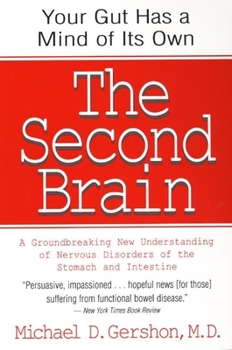The Second Brain: The Scientific Basis of Gut Instinct & a Groundbreaking New Understanding of Nervous Disorders of the Stomach & Intestine
Select Format
Select Condition 
Book Overview
"Persuasive, impassioned. . . hopeful news for those] suffering from functional bowel disease." -- New York Times Book Review
Dr. Michael Gershon's groundbreaking book fills the gap between what you need to know--and what your doctor has time to tell you.
Dr. Michael Gershon has devoted his career to understanding the human bowel (the stomach, esophagus, small intestine, and colon). His thirty years of research have led to an extraordinary rediscovery: nerve cells in the gut that act as a brain. This "second brain" can control our gut all by itself. Our two brains--the one in our head and the one in our bowel--must cooperate. If they do not, then there is chaos in the gut and misery in the head--everything from "butterflies" to cramps, from diarrhea to constipation. Dr. Gershon's work has led to radical new understandings about a wide range of gastrointestinal problems including gastroenteritis, nervous stomach, and irritable bowel syndrome.
The Second Brain represents a quantum leap in medical knowledge and is already benefiting patients whose symptoms were previously dismissed as neurotic or "it's all in your head."






